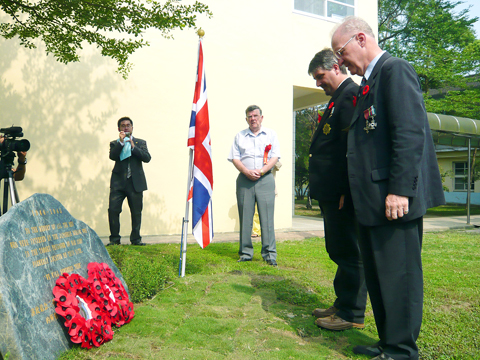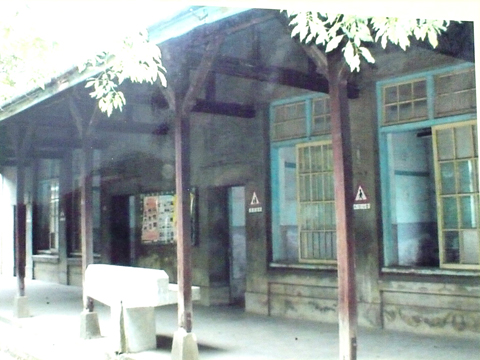Walking around the quiet, leafy campus of Gouba Elementary School in Douliou (斗六), Yunlin County, it is hard to imagine that the school was once used to house prisoners of war (POW) during World War II.
But from November 1944 until the end of the war, the school was home to the Toroku, or Douliou, POW Camp of the Imperial Japanese Army, or what POWs called “The Schoolhouse Camp.” Hundreds of US and British POWs were interned at the site before being moved to Shirakawa in Japan.

PHOTO: MO YAN-CHII
The location of the former camp was not confirmed until September 2000 when the Taiwan POW Camps Memorial Society visited the school in a bid to preserve the Japanese-style classrooms.
The original building, however, was torn down in 2003 out of safety concerns. The organization continued to communicate with the school, and was finally granted permission to erect a marble memorial at the site earlier this year.
“We should never forget the past. It’s not just a stone that we put up there, it’s what it meant for the POWs ... It is also an important piece of history for Taiwan and the local community,” said Michael Hurst, director of the organization.

PHOTO: MO YAN-CHIH, TAIPEI TIMES
Hurst traveled to the school with members and supporters of the organization on Saturday to commemorate the establishment of the memorial. At the ceremony, he told stories of the former POWs — who were too old to travel to Taiwan for the ceremony — to a group of school students and community members.
“All the surviving POWs are in their 80s or 90s, and it’s difficult for them to travel this far, and we don’t expect to see them coming back for memorials in the future,” Hurst said.
Although unable to be present at the memorial ceremony on Saturday, several POWs who had lived in the school camp shared their stories via e-mails.
“My work while I was there consisted of taking care of the vegetable garden plants ... we were always hungry and our thoughts were always of survival and getting back home,” US Army veteran Carl Pasurka said in an e-mail to the organization.
Raymond Harper of the US Navy said the POWs slept on cement floors in the classrooms and lived on rice and thin soup that only occasionally included vegetables.
Another POW, Alcide Benini of the US Army, described the Japanese commander in the school camp as a “pleasant man,” saying he had “probably the best Christmas as a POW” in 1944 because he helped lead church services.
Hurts said most of the POWs in the camp were in terrible physical condition, so they were not worked like slaves, as many were at the infamous “Hell Camp” in Kinkaseki, or Jinguashih (金瓜石), Taipei County. Some said they received good treatment in the camp during their imprisonment.
Gouba Elementary School principal Hsu Ching-hsuen (徐慶勳) said the school tore down the classrooms because of the lack of government subsidies for restoration work. However, he said the school valued what had happened on the school grounds and would pass on the history to its students.
Hsu said it was great to learn that local residents were friendly to the POWs, giving them sweet potatoes and cigarettes.
Still, the time in the school camp, as in the other 14 camps found in Taiwan, is an unbearable and dark memory for most POWs.
Although not a POW, Arthur Scholl, an 82-year-old US Navy veteran who now lives in Taipei, shared the pain of the POWs and the trauma the war has left them with.
“It’s only when I started to associate with the Taiwan POW Society that I was able to tell the stories in the wars,” he said.
Scholl talked in private about his experience fighting in World War II in the Philippines, in which he was almost killed on aircraft carrier, but was unable to speak at the ceremony because he was overcome with emotion.
The Japanese listed 4,344 POWs in Taiwan, with 15 POW camps. Except for the camp in Jinguashih, where some of the original structures remain, the other camps have been destroyed almost completely, Hurst said.
The recognition of the sites, however, will continue, he said.
The organization plans to hold a memorial ceremony at the remnants of the walls of Taipei Prison on Jinshan S Road on June 20 to commemorate the POWs who were executed in the old prison. It also plans to erect two more memorials at school camps in Yunlin County.
The stories of the POWs will be told even though the former POWs who spent part of their lives in Taiwan were unlikely to come to the island to tell their experiences in person.
“Our goal now is to bring their children and grandchildren here, and help them learn the past of their dads and granddad,” Hurst said.

Taiwan would benefit from more integrated military strategies and deployments if the US and its allies treat the East China Sea, the Taiwan Strait and the South China Sea as a “single theater of operations,” a Taiwanese military expert said yesterday. Shen Ming-shih (沈明室), a researcher at the Institute for National Defense and Security Research, said he made the assessment after two Japanese military experts warned of emerging threats from China based on a drill conducted this month by the Chinese People’s Liberation Army’s (PLA) Eastern Theater Command. Japan Institute for National Fundamentals researcher Maki Nakagawa said the drill differed from the

‘WORSE THAN COMMUNISTS’: President William Lai has cracked down on his political enemies and has attempted to exterminate all opposition forces, the chairman said The legislature would motion for a presidential recall after May 20, Chinese Nationalist Party (KMT) Chairman Eric Chu (朱立倫) said yesterday at a protest themed “against green communists and dictatorship” in Taipei. Taiwan is supposed to be a peaceful homeland where people are united, but President William Lai (賴清德) has been polarizing and tearing apart society since his inauguration, Chu said. Lai must show his commitment to his job, otherwise a referendum could be initiated to recall him, he said. Democracy means the rule of the people, not the rule of the Democratic Progressive Party (DPP), but Lai has failed to fulfill his

A fugitive in a suspected cosmetic surgery fraud case today returned to Taiwan from Canada, after being wanted for six years. Internet celebrity Su Chen-tuan (蘇陳端), known as Lady Nai Nai (貴婦奈奈), and her former boyfriend, plastic surgeon Paul Huang (黃博健), allegedly defrauded clients and friends of about NT$1 billion (US$30.66 million). Su was put on a wanted list in 2019 when she lived in Toronto, Canada, after failing to respond to subpoenas and arrest warrants from the Taipei District Prosecutors’ Office. Su arrived at Taiwan Taoyuan International Airport at 5am today on an EVA Air flight accompanied by a

A 79-year-old woman died today after being struck by a train at a level crossing in Taoyuan, police said. The woman, identified by her surname Wang (王), crossed the tracks even though the barriers were down in Jhongli District’s (中壢) Neili (內壢) area, the Taoyuan Branch of the Railway Police Bureau said. Surveillance footage showed that the railway barriers were lowered when Wang entered the crossing, but why she ventured onto the track remains under investigation, the police said. Police said they received a report of an incident at 6:41am involving local train No. 2133 that was heading from Keelung to Chiayi City. Investigators